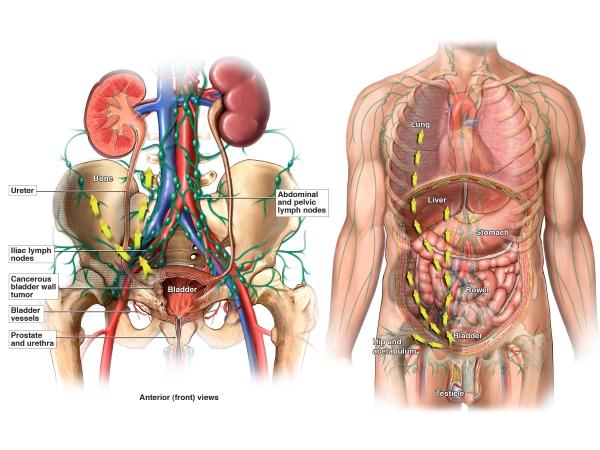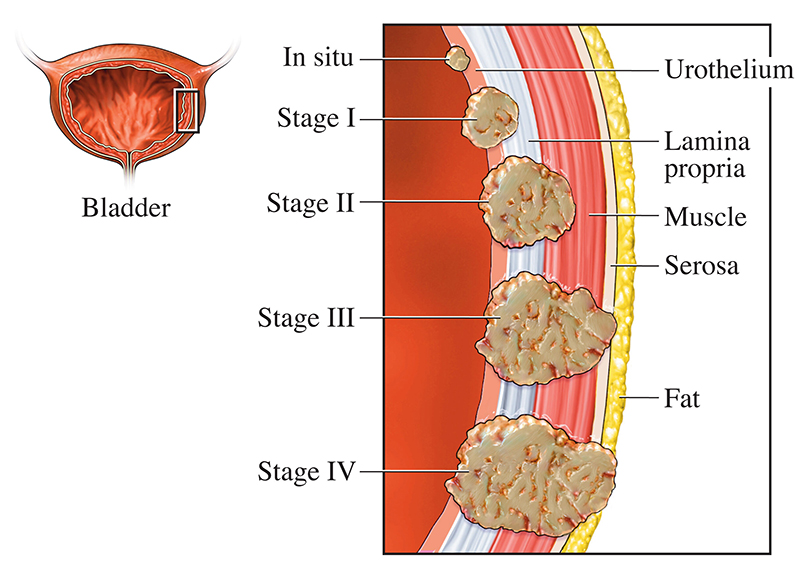Bladder Cancer Facts
What Is Bladder Cancer?
Bladder cancer is a disease in which cells in the urinary bladder start growing abnormally and uncontrollably.
- About 90 percent of bladder cancers are transitional cell carcinomas (also known as urothelial carcinomas), which begins in the cells that line the inside of the bladder.
- Rarer bladder cancers include squamous cell carcinomas (originating from flat-shaped cells), adenocarcinomas (from mucus-secreting gland cells), small cell carcinoma (from nerve-like neuroendocrine cells) and sarcomas (from the bladder’s muscle cells).

What are the Types of Bladder Cancer?
-
Non-muscle-invasive bladder cancer (NMIBC)
-
These cancers are the most common and about 90 percent of bladder cancers are transitional cell carcinomas (also known as urothelial carcinomas), which begins in the cells that line the inside of the bladder.
-
- Muscle-invasive bladder cancer is when the cancer has grown into deeper layers of the bladder wall. These are more likely to spread to other organs and are harder to treat. Rarer bladder cancers include:
- squamous cell carcinomas: Accounting for about four percent of bladder cancers, this cancer forms in the squamous cells, thin, flat cells that appear in the bladder in response to long-term infection or irritation. Over time, they can become cancerous.
- adenocarcinomas: This type develops from glandular cells that release mucus and other fluids, and is responsible for about two percent of all bladder cancers.
- small cell carcinoma: Beginning in the nerve-like neuroendocrine cells, this cancer is extremely rare. It is highly aggressive and often diagnosed at advanced stages.
- sarcoma: Another rare bladder cancer, sarcoma starts in the muscle cells of the bladder.

The choice of treatment and the long-term outcome for people who have bladder cancer depend on the stage and grade of the cancer.
- The stage is determined by the cancer growth in the bladder wall and how far it has spread to nearby tissues and other organs, such as the lungs, the liver, or the bones.
- The grade depends on how abnormal the cancer cells look under a microscope and how quickly the tumor is likely to grow and spread. Tumor grade helps determine risk of recurrence and progression in bladder cancer.
What are the Signs and Symptoms of Bladder Cancer?
Most common bladder cancer symptoms are linked with urination changes, including:
- Blood in the urine
- Pain or burning sensation during urination
- Weak urine flow
- Urgency to urinate, even with bladder is not full
- Increased urination frequency
Bladder cancer may also cause more generalized symptoms, such as:
- Pain in the lower back or pelvic area
- Fatigue
- Swelling in the feet
- Loss of appetite and unexplained weight loss
Although these symptoms can be caused by other conditions, you should check with a doctor – preferably a urologist – so they can make a definitive diagnosis.
What Increases Your Risk of Bladder Cancer?
Factors that can elevate risk of bladder cancer include:
- Smoking: Smoking causes approximately half of all bladder cancer cases and smokers are three times more likely to get bladder cancer compared to nonsmokers.
- Age: Approximately 90 percent of cases are diagnosed in people older than 55.
- Gender: Bladder cancer is more common in men.
- Chronic bladder infections or irritations, including prolonged use of urinary catheters
- Workplace chemical exposures: Chemicals called aromatic amines, which are used in the dye industry, can cause bladder cancer. As such, people work in printing, painting, textiles and hairdressing industries may have a higher bladder cancer risk.
- Prior treatment with radiation therapy in the pelvic area or with chemotherapy
- Genetic mutations: Having certain changes in the genes that are linked to bladder cancer.
Sources: National Cancer Institute and American Cancer Society